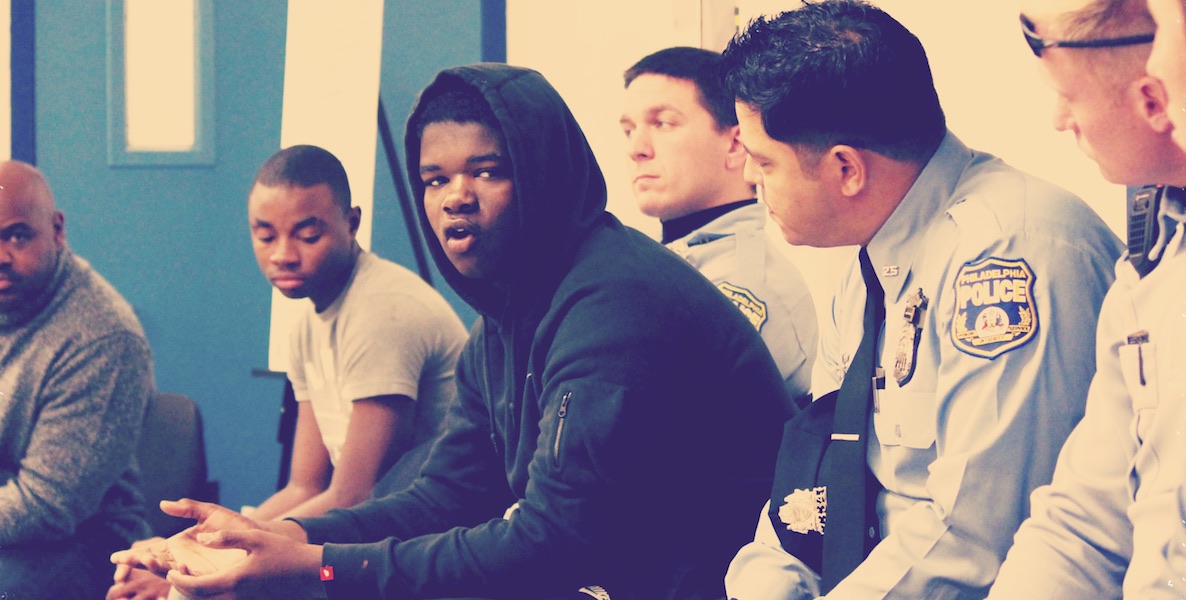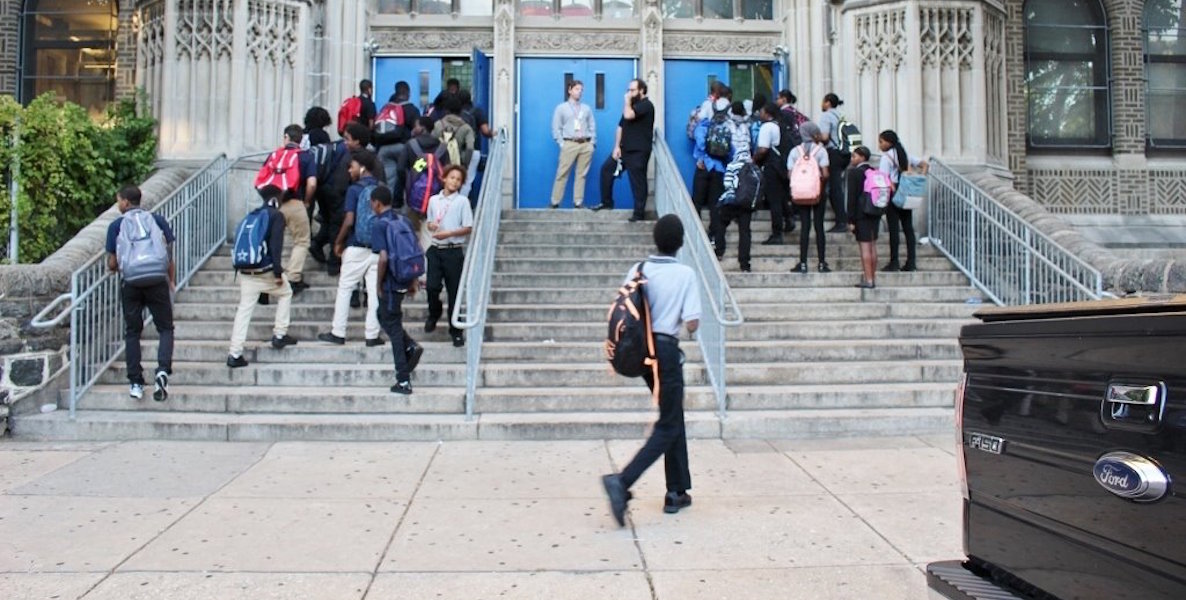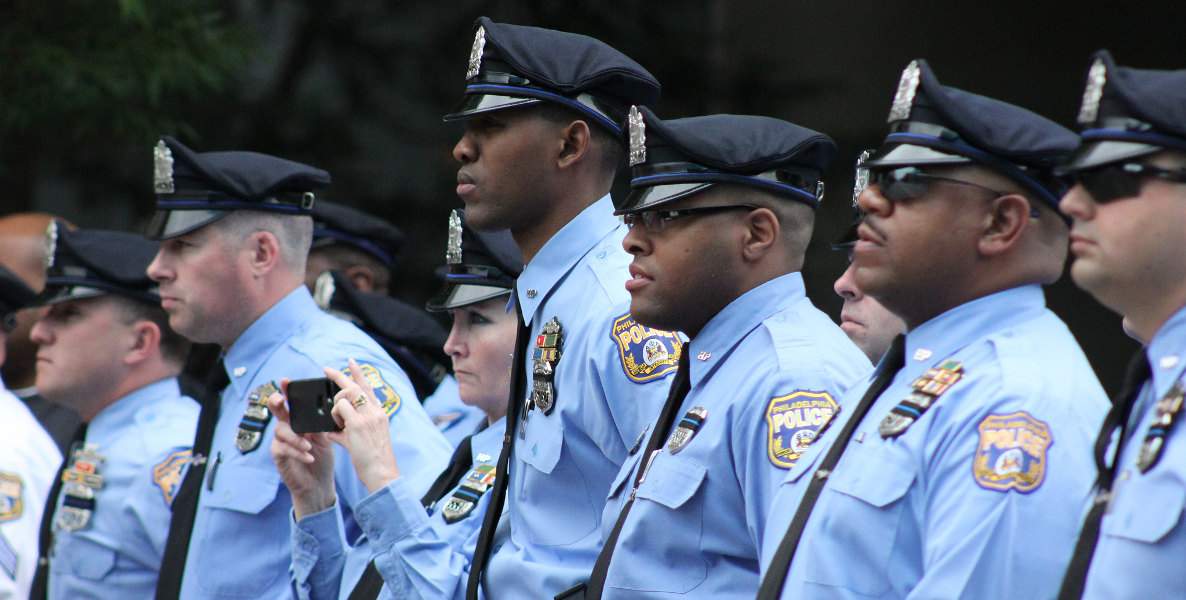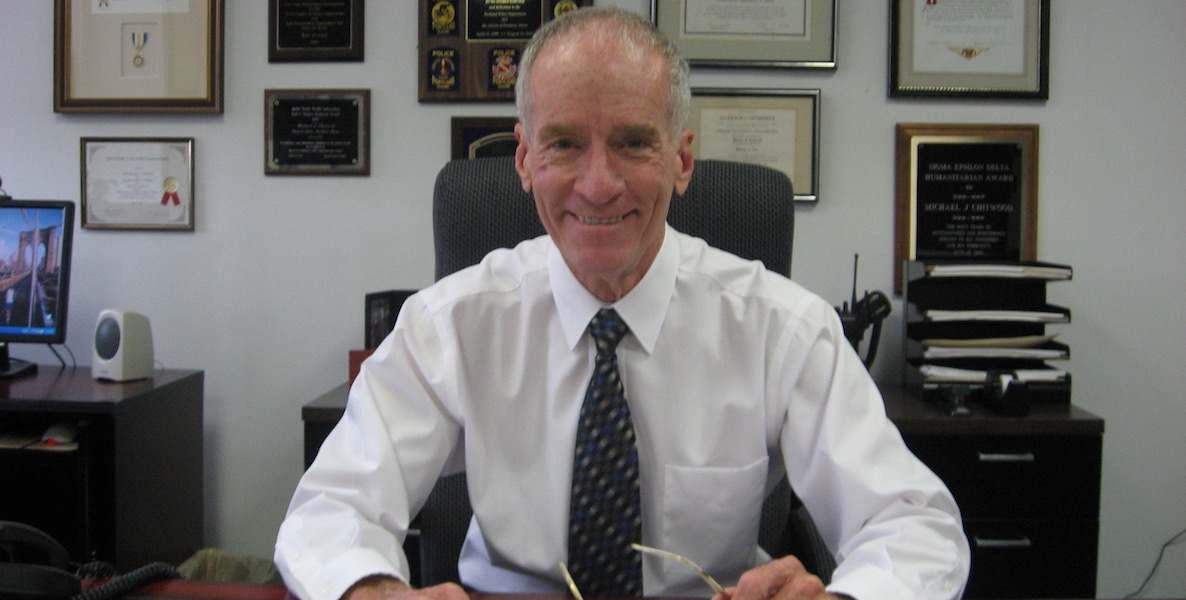To spend any time with Mike Chitwood, 73-year-old Upper Darby Chief of Police and the most decorated cop in Philly history, is to step foot inside a 1970s TV police procedural, like you’ve suddenly been transported onto the set of Kojak. Criminals are “shitheads,” “baddies,” and “scumbags”—occasionally you still see around Upper Darby the Chitwood T-shirts his officers were pedaling about a decade ago, the ones that read, “Not in my town, Scumbag!”
He’s a cop’s cop, nicknamed “Dirty Harry” during his time on the Philly force, when—among other high and lowlights—he solved the infamous Holly Maddux cold case, arresting Ira Einhorn for the murder. He boasts that he holds a “Ph.D of the street;” even today, there he is, on drug raids, gun drawn, kevlar vest on, the fifth cop through the door—“I used to be the second in, but some of these 22 year olds behind me were about to fucking run me over, so I dropped back.”
In the aftermath of the rash of police shootings since Ferguson, some police departments have turned to EI training in an effort to help their officers develop deescalation skills. Departments in the urban Northeast, however, lag behind the trend. Chitwood not only wants to bring EI to Upper Darby, but to elevate its standing in the hiring process, making it as key a component as a candidate’s polygraph, psychological testing, and background check results.
He’s profane, he’s blunt, and, at first blush, something of a dinosaur, a relic of a “law and order” era that has fallen into disrepute during a cultural moment that values social justice protesting over “lock ‘em up and throw away the key” rhetoric. You’d think Chitwood would be our Sheriff Joe Arpaio, the in-your-face Arizona sheriff who, by the time he was deposed by voters after 24 years last fall, had become a sign of all that was, or should be, past: anti-immigrant bias, racism, brutal and corrupt policing.
In the aftermath of the rash of police shootings since Ferguson, some police departments have turned to EI training in an effort to help their officers develop deescalation skills. Chitwood not only wants to bring EI to Upper Darby, but to elevate its standing in the hiring process, making it as key a component as a candidate’s polygraph, psychological testing, and background check results.
But don’t let Chitwood’s marketing fool you. He may share Arpaio’s larger than life persona—Chitwood has long been known as “Media Mike”—but his message is decidedly reformist. Mike Chitwood just may be America’s most unlikely, and radical, challenger to policing’s conventional wisdom.
“I’ve got this philosophy,” Chitwood told me recently, over coffee. “Based on my 53 years [in policing], I can say unequivocally that we—cops—are the catalyst for the negativity that occurs in urban communities. Because, with our macho cop culture, we don’t know how to fucking talk to people. We gotta approach people on the street with a customer service attitude. There’s this buzzword now, ‘emotional intelligence.’ That means understanding yourself and those around you. What’s your trigger? What’s theirs? Like I know that mine is being called a motherfucker. Someone calls me a motherfucker, I know I gotta take a deep breath and take a step back.”
So now Chitwood is trying to reform his 133-officer department by asking his cops to look inward. Though part of Delaware County, the streets of Upper Darby have grown increasingly urban—Chitwood reports that there are something like 50 languages and natives from 75 countries represented within his department’s borders. His customer service mantra—“treat people on the street like you’d want to be treated”—has always been an expectation, but now he’s adding a curriculum in emotional intelligence in to the mix.
“I’m developing a program with a psychologist to train every officer, so they learn their own triggers,” he says. “Because, more often than not, it’s the police that cause the negative environment. When you stop somebody on the street, the interaction goes to shit because officers don’t know how to talk. Every complaint I get, it’s ‘He disrespected me. He talked down to me.’ That’s what we have to focus on. Body cameras? Shooting? Knowing procedure? All good, but it’s all bullshit if you can’t talk to people and don’t know what’s going to set you off.”
In the aftermath of the rash of police shootings since Ferguson, some police departments have turned to EI training in an effort to help their officers develop deescalation skills. Departments in the urban Northeast, however, lag behind the trend. Chitwood not only wants to bring EI to Upper Darby, but to elevate its standing in the hiring process, making it as key a component as a candidate’s polygraph, psychological testing, and background check results.
“Veterans get an automatic 10 points—if you score a 90, but you’re a veteran, you’ve gotten a 100,” Chitwood says. “So we’re hiring a lot of people with a military background. That’s good from the standpoint of understanding what an organization is and understanding discipline. But it’s bad if they have post-traumatic stress. That’s where understanding EI comes in.”
It’s all a little touchy-feely, particularly coming from Dirty Harry. This is a guy whose first collar came before he was even a cop; in 1964, he was a skinny South Philly kid who broke away from a police academy training exercise to apprehend a robber after a 15-block chase.
For years, he didn’t even carry a gun—“I’m a lousy shot”—and once wielded a pool cue to arrest a “West Philly shithead” wanted for three murders. In the mid-‘70s, there were Inquirer headlines and an FBI investigation surrounding brutality allegations; he was never charged. “I didn’t do what they said,” he says, “but I was willing to take the hit.” (“We did what we had to do,” Chitwood once told Philadelphia magazine. “If we wanted to talk to somebody, they’d come with us. If they didn’t want to, we might…coerce them. But we didn’t beat anyone all the way down to the Roundhouse. They reported some things that just weren’t true.”)
“Based on my 53 years [in policing], I can say unequivocally that we—cops—are the catalyst for the negativity that occurs in urban communities,” Chitwood says. “Because, with our macho cop culture, we don’t know how to talk to people. We gotta approach people on the street with a customer service attitude. There’s this buzzword now, ‘emotional intelligence.’ That means understanding yourself and those around you.”
Chitwood’s message about emotional intelligence resonates because of all that. Just like Nixon’s Red-baiting rhetoric inoculated him from “soft on communism” criticism, so too does Chitwood’s CV shield him from charges of going all New Age-y when he urges his cops to get in touch with their feelings. He tells them that—thanks to social media and cell phones—they operate in a fishbowl now, and should always assume that someone’s watching.
He tells them what Frank Rizzo told him back in the ’70s: “If you go to battle, once the guy goes down, the fight is over,” he says. “It’s done. There don’t need to be any more additional kicks and I don’t want to see anybody fall down the steps and I don’t want to see anybody banging their head on the overhead of the police car. I don’t want to see that, ‘cause I know it happens.”
So how did Dirty Harry get sensitized? Chitwood points to two epiphanies. One came here in Philly, at the 1983 trial for the killer of 12-year-old Nicky Caserta, whose lifeless body in her Kensington basement is an image Chitwood still can’t shake. She was the same age as his daughter, Beth Anne. On the witness stand, he started to tear up, and, surprising himself, broke down crying. “I still remember standing at Broad and Chestnut after that, with Jill Porter of The Daily News,” he says. “She asked me what happened. ‘I discovered today I’m a human being,’ I said.”
When he became the police chief in Portland, Maine, in 1988, he walked into what could have been a powder keg. Portland was a refugee resettlement city; suddenly, 10,000 Sudanese and Somalis were living amongst Portland’s 98 percent white population. The Sudanese and Somalis hated one another; Chitwood would regularly meet with both groups. It was in those meetings that Media Mike learned how to listen.
“These were people who, in their home countries, were doctors, lawyers, and now they were cab drivers and janitors,” he says. “They’d tell their stories, and I was, like, ‘Wow.’ It was always the military and police who were killing, maiming, robbing and pillaging their communities. Holy shit, I thought. We’ve gotta convince them we’re not the enemy.”
By the time he left Maine in 2005 for Upper Darby, serious crime had dropped 60 percent during his tenure. Here, it’s gradually come down since 2008. “What I found here was pretty much the same thing,” Chitwood says. “We’ve got new arrivals from Russia, Syria, Iraq, Somalia, Sudan. You gotta listen and have relationships with these people if you want to have a community.”
Just like Nixon’s Red-baiting rhetoric inoculated him from “soft on communism” criticism, so too does Chitwood’s CV shield him from charges of going all New Age-y when he urges his cops to get in touch with their feelings. He tells them that—thanks to social media and cell phones—they operate in a fishbowl now, and should always assume that someone’s watching.
That’s why, when it comes to the issue of Sanctuary Cities, Chitwood takes a practical, empathetic approach. “I’m not the immigration police,” he says. “I don’t want my officers looking for green cards. Do I know there are people in Upper Darby illegally? Absolutely. It’s the Spanish speaking, mostly Mexican population. If someone commits a heinous crime—murder, rape, robbery—I’m going to lock them up and call whoever I gotta call to get rid of them. I don’t have a problem with that. But they’re more victims than baddies in that community. The problem I have is, when they become victimized, they don’t cooperate with police because they fear they’re going to be deported. So the baddie from Philly comes down here on a Friday night and knows he’s got free reign. He knows that, at 2 in the morning, he can grab a Mexican walking down the street so drunk he can’t see. And he’ll beat the shit out of them and rob them and he knows they won’t say anything. I see it all the time.”
Meantime, like crime fighting, training his officers to react on the street in an emotionally intelligent way continues to be a work in progress. On Saturday, April 15, a Philadelphia man with a lengthy record—including attempted murder—led Philly cops on a high speed chase on a dirt bike through Upper Darby, hitting a 6 year old girl and her aunt near 69th Street.
Chitwood got to the scene after the perp had been apprehended; a crowd had formed, cell phones out, filming. Three bystanders lifted up the yellow police tape and started traipsing across the crime scene—a shortcut. An officer went ballistic, launching numerous verbal grenades having to do with the status of their mothers. They, in turn, got up in his face. “Uh, oh, this isn’t good,” Chitwood thought, wedging himself between the combatants. And then he did what he’s learned to do, what a younger Chitwood might not have. When things get loud, he gets softer. “Look, look,” he said. “This is an emotional time. There’s a little 6 year-old girl’s been hit.”
“Chitwood!” one of the young men yelled. “Why he gotta disrespect me?!?”
“I hear ya, I hear ya,” the police chief said. “There’s a lot of tension. We all need to cool down and think about that little girl.”
Suddenly, silence. And then Chitwood pulled his officer aside, and told him he’s got to learn to take a step back and not react instinctively from a place of ego.
Did he get it? I ask. “I think so,” Chitwood said, this unlikely Zen master. “But it’s like I always say. We hire from the human race.”







